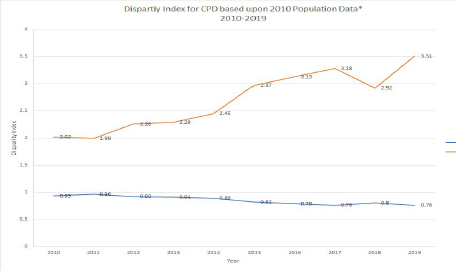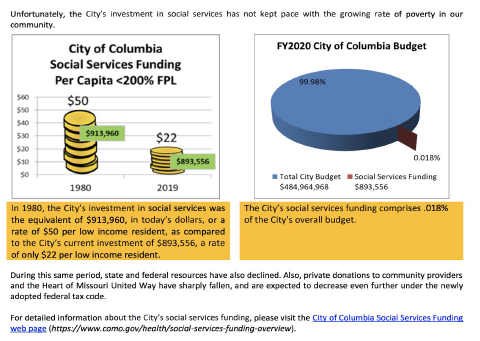On May 29, 2020, the Missouri Attorney General’s Office released its annual vehicle stops report (VSR), which, according to the office, “breaks down the data as it relates to race, number of stops, search rate, contraband hit rate, arrest rate, and more.
According to the data, racial disparities for Columbia, Boone County, and the State of MIssouri have increased yet again in 2019. The Attorney General states that data collection in 2020 will assist analysis of the identity of drivers for next year, acknowledging that the drivers of increasing racial disparities cannot be concluded by collecting data.
The summary remains focused, as is local law enforcement, on the inability to discern the intent of individual police officers and only measures the increasing disparity.
● Columbia Police Chief Geoffrey Jones “…promised accountability within his department and to work towards change .” (Columbia Missourian, 1 June 2020)
● Mayor Brian Treece: “It’s our responsibility to break down systems of institutional racism .” (Columbia Tribune, 1 June 2020)
However, Race Matters, Friends asks:
● Where is the accountability?
● Where and how is the City of Columbia breaking down institutional racism in the criminal justice system and in local policing?
We see no evidence of either, particularly while known anti-black officers are still employed in the department. We are not getting any answers.

Adjustments were made to disparity rates to reflect population changes from 2014 going forward (using population estimates from the American Community Survey). While the disparity rates are lower in each of those years, they are only slightly so, and do not change the overall trend.
These disparity rates indicate that in 2018, Black drivers were 4.32 times more likely to be stopped than white drivers in Columbia. While disparity rates have increased over time for Black drivers, they have declined slightly for white drivers.
Black drivers are more likely to be searched during stops, while contraband was found at only slightly higher rates for Black drivers. The 2019 contraband hit rate for white drivers was 45.75 and 50.05 for black drivers.
In Columbia, traffic stops are used as investigative tools as much, if not more than, for traffic enforcement. Columbia’s traffic stop disparities are a direct result of choices in policing strategy.
Police stop Black drivers (commonly referred to as “hot-spot policing") in the hopes that they will stumble across a suspect or a driver carrying contraband such as a weapon, drugs and alcohol, or stolen property.
We believe this practice is the equivalent of searching for a needle in a haystack, which results in devastating consequences for our community.
The figure below was taken from an August 19, 2019 presentation by RMF member Tara Warne-Griggs to Columbia's Vehicle Stop Committee. Itshows the impact in terms of arrests and contraband found.

Implications:
The VSR continues to ignore the fact that the data consistently reflects the systemic racism of state, county, and local laws. While implicit bias is widely recognized as a factor affecting the discretion of individual officers, the broader impact of policies and procedures on minority drivers who are ever increasingly impacted by law enforcement are not addressed.
RMF’s Observations:
While the role of individual officers’ unconscious (i.e. implicit) bias and their choices are certainly factors for which all law enforcement agencies are morally responsible, the continued deflection away from the inequitable burden of non-white citizens in contact with law enforcement further perpetuates the larger systemic disparities of racism.
RMF's Call to Action:
We have drastically restructured our volunteer and membership drive and management processes. The responses generated from the uptake form serve as a robust tool from which to quickly sort and cull a list of specific volunteers for specific events and projects.

Since the onset of our campaign for community policing, RMF has consistently demanded accountability on tax dollars spent and invested in the Columbia Police Department (CPD).
We know that two-thirds of the City of Columbia’s budget is spent on public safety, the lion's share of which is policing. This leaves a miniscule sum (1.8% of the General Fund) available to the City/County health and human services department, where per capita spending has not increased since 1980.
At 1.8 percent of our city’s budget, Public Health and Human Services (PHHS) displays how little we are protecting and valuing our least advantaged citizens. While funds given to social services are contingent on measuring the impact of those services, the police department is not accountable for the value that we receive in return for allocating the majority of our tax dollars to their support.
Given the increasingly disparate impact of city law enforcement on our minority citizens, neither the mayor nor the council have held CPD accountable for implementing the Mayor’s Task Force on Community Violence (2014), nor to the principles outlined in the President’s Task Force on 21st Century Policing (2015).
The historical and inequitable return in investment that continues to unfairly allocate the majority of our tax dollars to CPD needs to be interrupted.
We insist and demand an increase in per capita spending that meets today’s (2020) needs and beyond, that responsibly invests in health and human services.
In our view, the ever-increasing expenditures on defensive policing continue to produce an array of disparate outcomes and impacts on our citizens of color whose needs as a community have been historically neglected by political priorities that target the most privileged members of our city.
African Americans in Columbia are less transient than the white population here. The ancestors of today’s African American Columbians built the campuses of The University of Missouri, Columbia College, and Stephens College under the oppression of slavery. Although a minority of our population, they have historically invested capital in Columbia to a greater extent than most white citizens living in Columbia today.
What do we owe them to restore and repair decades of social exclusion, neglect and political antipathy?
In closing, RMF is still awaiting responses from Chief Jones, the Mayor and Council from our March 2, 2020 letter of concerns, with the full understanding that the COVID-19 pandemic has been a setback for everyone in terms of timelines.
Race Matters, Friends is a non-profit 501(c)3 organization dedicated to anti-racism education, community consciousness-raising, and social equity.
Since 2015, the group has been a persistent advocate for Community-Oriented Policing.
We, the citizens, are the power structure, and have the capacity and ability to re-imagine a just, equitable, and safe future for Columbia.